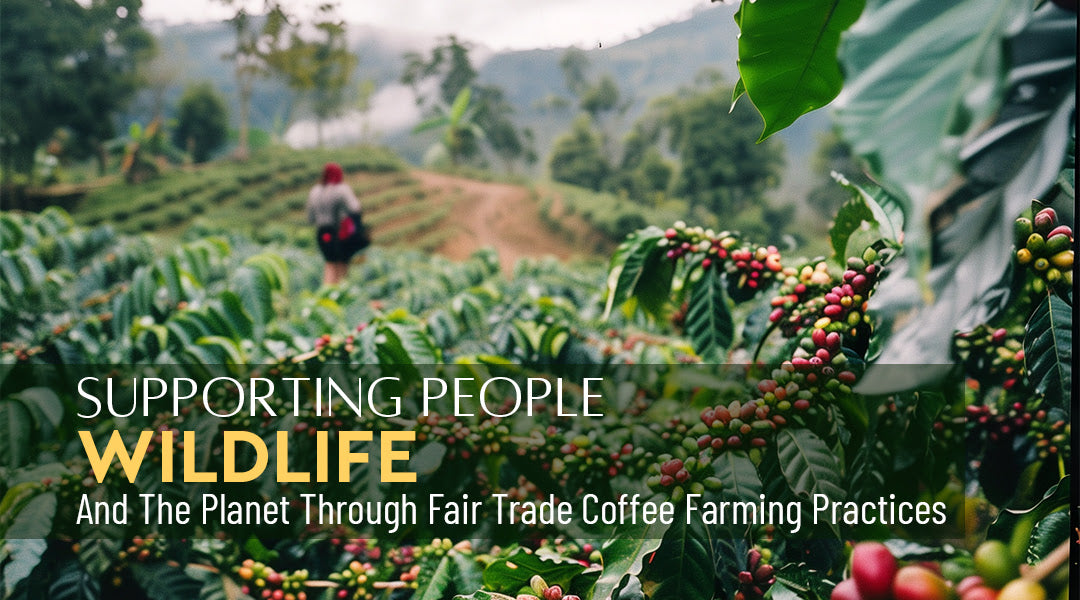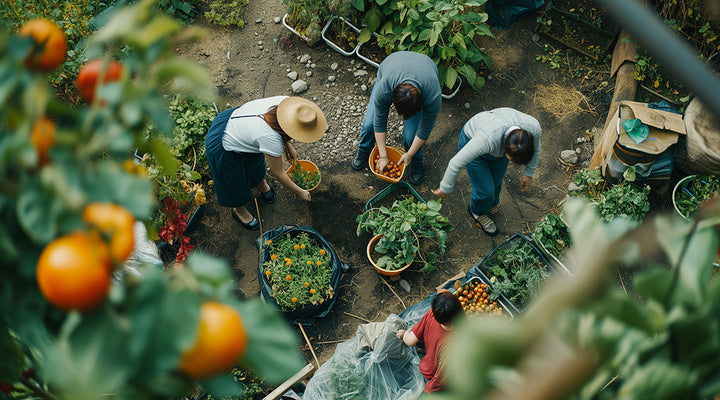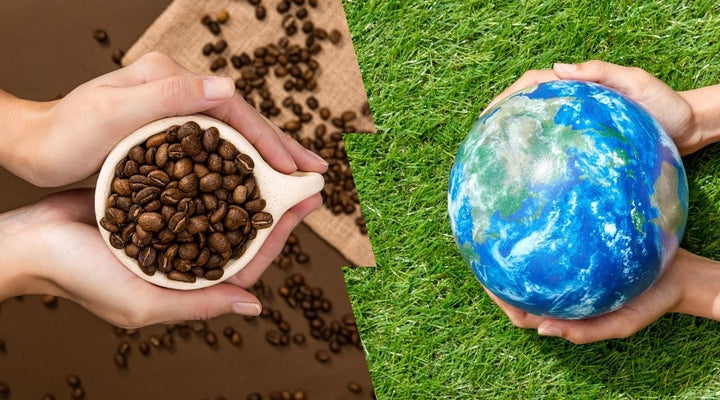
Supporting People, Wildlife, And The Planet Through Fair Trade Coffee Farming Practices
Traditional coffee farming methods require the removal of acre after acre of rainforest vegetation, robbing wildlife habitats.
Mass market coffee farming typically uses chemical after chemical to avoid pests and accelerate plant growth, causing harmful working conditions for farmers while also decreasing soil quality and polluting the air and nearby waterways, all of which harms wildlife, the planet as a whole, and the health of consumers.
With traditional coffee farming methods, biodiversity also decreases and farmers and their families live in extreme poverty, all while large coffee corporations meet growing demands and increase profits.
I guess the solution here is to have everyone stop drinking coffee to avoid these horrific outcomes, right?
Thankfully, there’s a better way to grow coffee, a better way to support coffee farmers, and a better way to preserve our wonderful planet!
Fair trade coffee practices are essential for coffee farmers to thrive, they play a necessary part in protecting our planet and its wildlife populations, and even the health of consumers is prioritized with fair trade, which begs the question:
What is fair trade coffee farming?
I’m glad you asked…
What Is Fair Trade Coffee?

I grew up in rural Indiana where corn and soybean fields were by no means in short supply.
My siblings and I would watch the farmers, only a few feet from our front and back yard, working tirelessly in the fields all throughout the planting and harvesting seasons.
We witnessed their labors. We heard their gratitude for bountiful harvests. And, sometimes we’d see or hear their fear and worry expressed as pests, rain, and drought would threaten the crops and their livelihood.
Such is the life of a farmer, no matter the crop, as many factors weigh upon the success or failure of each season filled with planting, laboring, and harvesting.
We can easily see this regarding those plants or foods grown here in the states, but it seems such efforts can be forgotten when it comes to those items grown past our collective front yard.
Yes, coffee farmers face some of these same threats, and more, as they tirelessly labor to grow one of the world’s most sought after products.
And, to make matters even more troubling, many coffee farmers struggle to provide for their families despite their hard work and dedication simply because they aren’t paid a fair price for the goods they’re providing.
In fact, coffee farmers are commonly paid less than what it actually costs to grow the coffee they seek to sell in the first place.
In these situations, by the time farmers hire extra laborers to aid in harvesting and pay for fuel and transportation to take their coffee cherries to be processed, they often find themselves living in extreme poverty, going further into debt with each passing year, or needing to find a different means to support their families entirely.
For some, this can mean walking away from the only life they’ve ever known, the life of a coffee farmer.
And sadly, this is happening to both large and small coffee plantation owners.
In the case of small, family coffee farms, nearly half of these generational farming families are living in poverty, with some living in extreme conditions.
Then, in the case of those farmers tending to mass market coffee crops, these laborers are often the lowest individuals on the coffee trade totem pole, being forced to sell their product to importers and other middlemen who ultimately turn around and sell the coffee (for greater profits) to large retailers.
If you’re thinking this all sounds pretty bleak, even second guessing the need for a morning cup or two at this point, you’re not alone.
And, this is where fair trade coffee farming comes into play…
Fair trade coffee farming not only benefits those growing the coffee but it’s actually a win, win, win situation.
Coffee farmers, the environment, and consumers all benefit from fair trade farming practices!
Here’s how…
Fair trade coffee is a collaborative effort, where farmers and corporations work together to exact change, positive change that is.
The focus in fair trade farming begins with planting and follows the growing process all the way to your pantry.
In other words, fair trade practices ensure fairness for farmers and responsibility in growing, processing, roasting, and selling the final product - in this case, coffee.
1- Fair Trade Benefits Farmers

Fair trade farming practices are truly just what they sound like - fair.
Fair trade ensures that farmers work in safe conditions, have reasonable hours, are of a legal age (fair trade prohibits child labor), and are paid a fair wage.
And, for farmers, this also means no more totem poles!
I used the analogy of a totem pole above as coffee farmers are commonly at the bottom of the pole when it comes to selling a product they’ve worked tirelessly to grow.
In the case of fair trade farming, however, farmers actually receive a wage better suited to not only their services, but the quality of their product as well.
Receiving a fair wage means farmers can avoid crippling debt, fully support their families, and live happy lives doing work they enjoy.
Paying farmers a fair wage even has a ripple effect as entire villages and economies benefit when members of the community make fair wages, prompting improvements in education, healthcare, and more.
2- Fair Trade Benefits The Planet

For coffee to be considered fair trade, a variety of standards must be met, and this benefits not only the farmers, but the planet as well.
The standards for fair trade coffee farming focus on the conditions in which farmers grow their crops as well as the practices they use in this process.
Overall, there is a slight difference between fair trade coffee and fair trade organic coffee, as organic certification requires more rigorous practices to benefit (and not harm) the environment, but the two are very similar.
As there’s a great amount of overlap in organic growing standards and fair trade practices, nearly half of all fair trade coffee farmers make the choice to become both organic and fair trade certified.
Looking at fair trade alone, this type of coffee is grown using sustainable farming methods.
- Sustainable farming considers the crops being grown, the land/soil, surrounding wildlife, and nearby waterways.
- Sustainable farming seeks to protect against erosion, limits waste disposal, and conserves water.
- When incorporating sustainable farming methods, coffee growers seek to preserve and promote biodiversity.
- Fair trade farming seeks to protect soil fertility, and minimizes the use of pesticides and other agrochemicals (whereas fair trade organic would omit chemicals entirely).
- All GMOs and several hazardous materials are prohibited in fair trade farming practices.
3- Fair Trade Benefits The Health Of Consumers
Coffee possesses powerful health benefits, but those rewards can be diminished by the presence of mold, mycotoxins, pesticides, fertilizers, and other harsh chemicals commonly used when growing this beloved bean.
When consumers choose fair trade coffee, especially organic fair trade coffee, they can reap all the benefits coffee has to offer, without the added chemical load.
Is Lifeboost Coffee Fair Trade?

Obviously, Lifeboost is a coffee company, but after detailing the woes of traditional coffee farming methods as well as the benefits of fair trade farming, it’s important to know exactly what kind of coffee company Lifeboost truly is.
Our website’s homepage details a lot of information about the kind of coffee we sell, what we believe and practice, as well as many testimonials from doctors and customers alike.
For instance, here’s one statement you’ll find if you scroll through our homepage information:
“We pay our farmers a fair wage. They use sustainable farming which protects the environment and wildlife. We donate a percentage of profits to protect the planet and animals that live in our coffee regions.”
This statement is certainly true, but after we’ve detailed the importance of fair trade coffee farming methods today, we’d like to expand upon what we’ve listed on our website, breaking down the above statement to examine each of those claims in greater detail.
First, “we pay our farmers a fair wage.”
Lifeboost coffee is fair trade certified, which means paying our coffee farmers a fair wage is a done deal, a top priority…no ifs, ands, or buts.
We work closely with our farmers so we can better know their needs, discuss any problems they may be facing, and ensure they are fairly compensated for their labors.
And, by paying our farmers a fair wage, these families can continue a work that’s been done for generations, passing down coffee farming wisdom that is truly invaluable.
But, we also know fair pay is only a small part of the equation when it comes to supporting our farmers and their communities.
When farmers make a fair wage, this inherently improves the quality of life in their village or community, however this only goes so far.
We desire to see our coffee communities thriving, and this is why we’ve chosen to offer support beyond fair wages.
Most of our coffee is grown in Nicaragua, and here we’ve partnered with Project Alianza, an organization dedicated to building schools in impoverished Central and South American villages.
Typically, children in coffee farming villages grow up in poverty, and this is clearly reflected in the schools, where most children have to walk hours (one way) through dangerous mountainous terrain simply to attend classes.
Once they arrive, most often schools are without proper lighting, hygiene is a huge concern, materials are incredibly lacking, and sometimes the buildings are entirely unsafe, even falling apart.
Overall, many children do not graduate, forcing them to remain in these impoverished communities the rest of their lives, unable to break the cycle.
Not only are our coffee farmers paid a good wage, but by partnering with Project Alianza we’ve been given the privilege of seeing schools built in their villages, providing safe, hygienic, properly staffed, well-lit, educational opportunities for these children to learn, grow, and thrive!
Then, in the regions of Africa where our Lifeboost Africa coffee is grown, we provide school lunches, clean water, support women entrepreneurs, and more, with each measure supporting the lives of our farmers and the communities they live in past our fair wage standard and commitment.
As for the next part of our homepage statement - “they (our farmers) use sustainable farming which protects the environment and wildlife.”

This, of course, refers to how our farmers plant, grow, and harvest Lifeboost coffee.
Our coffee is both fair trade and organic, so this means we can guarantee all of our coffee is grown with your health and the health of our planet in mind.
When growing Lifeboost coffee, our farmers never use pesticides, herbicides, fertilizers, or any other chemical.
Lifeboost coffee is also grown at high elevations amongst native plant life, which means you never have to worry about our farmers clearing precious rainforest lands to produce your daily cup(s).
Truthfully, if you ask me, our growing practices truly paint a beautiful picture:
Lifeboost coffee shrubs grow amidst native plant life in the region, and the taller neighboring plants shade the coffee shrubs which causes them to grow to maturity at a slower rate.
As it takes longer to grow, this time is spent wisely for the coffee shrubs then absorbs a greater amount of nutrients from the soil, a source enriched naturally by decomposing leaves, waste from native wildlife, nearby growing plants, etc.
This type of environment truly negates the need or use of agrochemicals as the fertilization occurs naturally (which we just detailed) and even pest control is gained from native wildlife.
The canopy of shade above the coffee shrubs already acts as a barrier, but then those insects attracted to the coffee plants serve as pollinators while also bringing in other native birds and small wildlife which feast on such “pests.”
In other words, growing our coffee in this sustainable way, provides natural pest control and fertilization while also improving biodiversity!
In reality, our coffee plantations are small farms housing large ecosystems, those filled with enriched soils, clean water, active pollinators, predators, and prey, harmoniously laboring and living as life intended.
So sure, we’re passionate about bringing you great tasting, low acid coffee at Lifeboost, but we’re also passionate about preserving our planet, and that’s why we believe it’s monumentally important that our coffee growing methods support the health of the environment (from soil to native flora and fauna, waterways, air, and on and on).
Then lastly, “we donate a percentage of profits to protect the planet and animals that live in our coffee regions.”

Coffee is one of the most consumed beverages in the world. And, we know this means many mass market companies utilize practices we do not believe actually support the health of our planet.
So, with differing beliefs, we have sought to do things, grow things, differently.
Unfortunately, this only makes a small drop in a very large bucket.
That’s why, as a company, we actively seek to expand our impact to other areas by supporting those organizations which work to protect and preserve our world.
As we mentioned above, the rainforests take a big hit when it comes to coffee production.
This is why we grow our coffee in a protected region in the Nicaraguan rainforest, an enhanced measure ensuring our growing methods will only support the health of our planet.
But, this is also why we donate a portion of our profits to The Rainforest Trust, an organization which has, to date, protected 50 million acres of rainforest across the globe.
As these habitats are protected, 2,828 endangered, critically endangered, and vulnerable species have also been saved.
Every three seconds an acre of rainforest is deforested, and The Rainforest Trust is protecting acre after acre, saving our planet and its wildlife from this type of destruction.
In other areas where our coffee is grown, we’ve also adopted an endangered giraffe in Uganda (who we named Coffee Bean), and a Sumatran tigress named Cinta from Indonesia, where our Java Blue coffee is grown.
Through these adoptions, we hope to protect and bring awareness to these amazing species threatened by loss of habitat and resources.
Aside from these efforts, we also realize packaging and delivering goods, no matter the company or product, affects our planet as well, and this is why we’ve also partnered with EcoCart, which has helped us to more than offset our carbon footprint.
So, as we wrap things up, I suppose we could sum up this discussion or exploration by simply saying:
- We believe people matter, and this is why we pay our farmers a fair wage, want to see them thriving, and desire to support their families and communities. This is also why we’re committed to bringing you the cleanest, healthiest cup of coffee possible.
- We believe the planet matters, and this is why our farming methods will always be sustainable, never polluting our planet or endangering precious wildlife. This is also why we support those organizations working to protect and preserve the environment.
Disclaimer: Beginning in 2025, Lifeboost Coffee primarily sources our coffee from farms in Honduras. Our practices of fair wages, sustainable growing methods-from shade to zero chemicals-all are still a part of our operations and are key to what makes our coffee health, delicious, and ethical. Only our farming locations have changed so that we can continue these ethical practices while also meeting our customer demands.

Becky is a mother, educator, and content writer for Lifeboost Coffee. She has had three years’ experience as a writer, and in that time she has enjoyed creatively composing articles and ebooks covering the topics of coffee, health and fitness, education, recipes, and relationships.
- https://www.fairtrade.net/product/coffee
- https://www.fairtrade.net/news/realistic-and-fair-prices-for-coffee-farmers-are-a-non-negotiable-for-the-future-of-coffee
- https://www.drinktrade.com/blogs/education/fair-trade-guide
- https://www.coffeebeancorral.com/fair-trade-organic-fto-green-coffee.aspx#
- https://colombiancoffee.us/blogs/news/why-buying-directly-from-farmers-is-the-way-to-go
- https://www.fairtrade.net/standard/about
- https://www.rainforesttrust.org/
- References for the article to confirm data and information.










